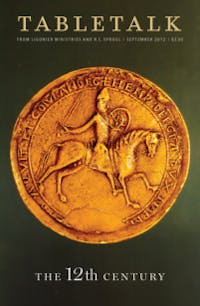
Request your free, three-month trial to Tabletalk magazine. You’ll receive the print issue monthly and gain immediate digital access to decades of archives. This trial is risk-free. No credit card required.
Try Tabletalk NowAlready receive Tabletalk magazine every month?
Verify your email address to gain unlimited access.
When Paul, under the inspiration of the Holy Spirit, describes the church as the body of Christ, he speaks more wisely than we fools tend to hear. As is the habit of the modern evangelical church, we take the full, rich, and, indeed, beautiful instructions on how we are to live our lives together for the kingdom and reduce them down to something true but banal, safe, and reasonable. Paul tells us we are the body of Christ, and we hear, “Be nice to each other.”
It is a slight improvement if this message reminds us that the body is filled with different people with different strengths, all of which are needful. That my ears can’t see is not an objection they voice; that my ears hear does not make them better than my eyes. Paul makes this point, of course, because whatever parts of the body we may be, we all carry around oversized prides. Ears may have some level of gratitude for eyes, but they still think they are themselves the key components of the body. Brains may be smart enough to note that without a heart they would die, but they are quick to point out the heart’s dependence on the brain. In short, every part of the body carries the temptation to rush to the front of the line, to hope to be the greatest in the kingdom of God.
What is true of us individually is often true of us in groups. Body parts of a feather tend to flock together. So it should not surprise us that when Reformed people get together, we celebrate the importance of the Christian mind. Without denigrating other parts of the body, we Reformed recognize that our peculiar strength is thinking through theological issues with care and precision. That’s a good thing. The Reformation, and that which preceded it, brought care and precision to questions of eternal consequence, such as, how are we made right with God? If you want a careful exposition of the nature of the incarnation, you would be wise to ask someone from a Reformed background. We are the scribes of the church, hunched over our dusty tomes.
If, however, you are looking for passion, for zeal, if you are looking for heart, you would not likely think to look to the Reformed. A mind full of knowledge we have. A heart filled with love, well, often that’s not so much us.
The danger of the body metaphor is that, to mix a metaphor, it can become a soft pillow. That is, it is helpful to remind us not to despise the strengths and callings of others. But it just might make us content in our own weaknesses. That we Reformed do theology well might make others comfortable in doing theology badly. On the other hand, that our hearts tend to be tepid is not counter-balanced by the passion of others. Neither, of course, does the sad truth that some have zeal without knowledge justify a lack of zeal.
Nor do the two balance each other out. That is, we don’t increase in our knowledge by decreasing in our zeal. Neither do we increase in our zeal by decreasing our knowledge. Rather, the two are supposed to feed and encourage each other. Consider the Apostle Paul. Even Peter recognized that Paul wrote some difficult-to-understand things (2 Peter 3:16). If ever there was a heavy, erudite theologian, Paul was the man. But heavy theology is not all that Paul wrote. Paul was given to ecstatic utterances even in his epistles. He would, from time to time, fall into fevered fervor. What we can’t miss, however, is the connection between the two. Paul didn’t write dry theology in 1 Timothy and mystical prose in 2 Timothy. He didn’t practice knowledge on Monday, Wednesday, and Friday and zeal on Tuesday, Thursday, and Saturday. Rather, his fits of praise flow right after, and better, right out of, his heavy theology, and then are followed by still more heavy theology. He moves seamlessly from orthodoxy to doxology and back again, and, thus, teaches us that we ought to be doing the same. What makes him ecstatic is the glory and the beauty of the truths he is communicating. What makes him careful, thoughtful, is the glory of the God and His gospel about which he is writing.
Our minds are to instruct our hearts, even as our hearts are to inspire our minds. If we are not emotionally shocked, if we are not given to fits of ecstasy, it isn’t ultimately because we are weak in the heart. It’s because we don’t understand, because we are weak in the mind. The truth is sufficient to overpower us, to turn our stiff upper lips to quivering lips. The truth seen rightly makes us unable to see for the tears in our eyes.
The kingdom of God that we seek first is worthy of our study. If, however, we don’t in turn celebrate its coming, we have failed to understand the kingdom. The kingdom of God is worthy of celebrating. If, however, we don’t in turn study it, we have failed to rejoice in it. Enter into the Word. And let the Word enter into you. Of such is the kingdom of God.
